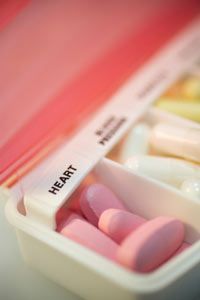An inotropic drug is a medicine that alters the force or strength of the heart's muscular contractions (heartbeats). There are two different types of inotropic drugs: negative and positive. Negative inotropic drugs make the heart beat less strongly, and positive inotropic drugs make the heart beat more strongly. Both kinds are used in the management of various conditions that affect the function of the heart.
One of the most important factors affecting the strength of the heart's muscular contractions is the level of calcium in the fluid inside the heart's muscle cells. Calcium is one of the most common electrolytes in the human body. Other common electrolytes are sodium, potassium, chloride and magnesium. We need the right balance of these electrolytes for proper functioning of the heart, nerves, muscles and kidneys.
Advertisement
Electrolytes are minerals that come from the foods we eat and fluids we drink. They're found in the fluids throughout the body -- not only in the blood and urine, but also inside the body's cells and in the space surrounding the cells.
Like their name suggests, electrolytes have an electrical charge, and they conduct electrical impulses (electricity). Electrical impulses generate muscle contractions. The level of each of the electrolytes must be kept within a narrow range in order for the body to function properly. In particular, it's important to maintain precise differences between the levels of electrolytes in the fluids inside the cells and outside the cells. It's these differences that allow our cells (especially nerve, heart and muscle cells) to maintain electrical voltages across their cell membranes, generate electrical impulses and produce muscle contractions.
Calcium plays an important role in the process of heart muscle contraction. In general, calcium levels are increased by positive inotropic drugs and decreased by negative inotropic drugs. But different types of inotropic drugs change calcium levels in different ways.
Next, we'll learn about the different kinds of inotropic drugs.
Advertisement
